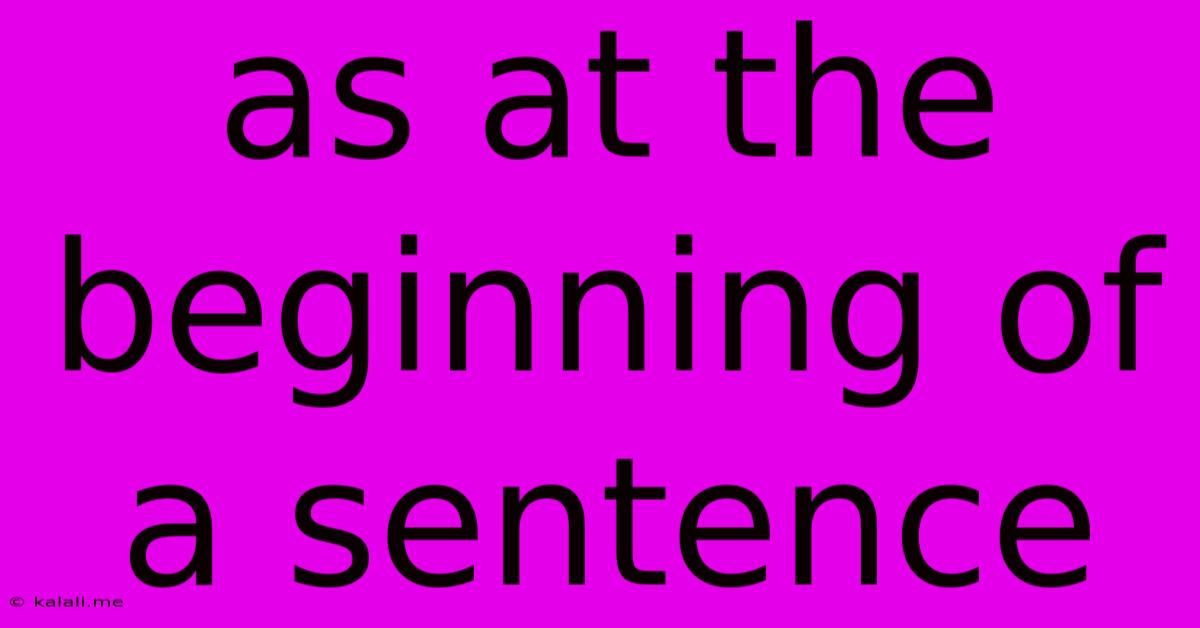As At The Beginning Of A Sentence
Kalali
May 29, 2025 · 3 min read

Table of Contents
"As" at the Beginning of a Sentence: Mastering its Versatile Uses
Using "as" to begin a sentence might seem grammatically suspect to some, but it's actually a perfectly acceptable and versatile word with several legitimate applications. This article will explore the various ways "as" can effectively kick off a sentence, providing examples and clarifying its nuanced uses to avoid grammatical pitfalls. Mastering these nuances will elevate your writing style and ensure clarity for your readers.
Understanding the Different Roles of "As"
The word "as" acts as a chameleon in grammar, shifting its function depending on the context. Its versatility can make it tricky, but understanding its different roles will make using it at the beginning of a sentence much easier. Here are some common uses:
1. As a Conjunctive Adverb: Introducing a Comparison or Contrast
This is perhaps the most common use of "as" at the beginning of a sentence. It introduces a clause that compares or contrasts with the previous sentence or idea.
- Example: The old house creaked and groaned. As the wind howled, the windows rattled violently.
Here, "as" introduces a subordinate clause that explains the effect of the wind on the house, creating a clear cause-and-effect relationship. Other similar examples include: "As the sun set, the shadows lengthened." or "As expected, the meeting ran over time."
2. As a Preposition: Indicating Time or Manner
When acting as a preposition, "as" shows how something happens or the time at which it occurs.
- Example: As a child, I loved to read fairy tales.
In this sentence, "as" indicates the time period during which the action occurred. Another example: "As per your request, I have attached the document." Here "as" indicates manner or compliance.
3. Introducing a Clause of Reason or Cause
"As" can also introduce a clause that explains the reason for something. This usage is often similar to "since" or "because."
- Example: As the evidence was inconclusive, the case was dismissed.
This shows that the dismissal of the case was a direct result of the inconclusive evidence. Note that this use should be distinguished from the comparative use.
4. Introducing a Clause of Condition (Less Common)
Although less frequent, "as" can also introduce a conditional clause, similar to "if." However, this use should be handled carefully, as it can sound slightly formal or archaic in modern writing.
- Example: As you sow, so shall you reap.
This is an example of a proverb using "as" to introduce a conditional clause implying a direct consequence.
Avoiding Common Mistakes
While versatile, using "as" at the sentence's beginning requires care. Avoid these common pitfalls:
- Overuse: Avoid starting too many sentences with "as." This can make your writing monotonous.
- Ambiguity: Ensure that the relationship between the clauses is clear. If the connection is unclear, rephrase the sentence.
- Informal Register: While perfectly acceptable, be mindful of the overall tone of your writing. In highly formal writing, alternatives like "because," "since," or "while" might be preferable.
Conclusion
Mastering the use of "as" at the beginning of a sentence enriches your writing style. Understanding its different roles and potential pitfalls will empower you to use it correctly and effectively, improving clarity and flow in your writing. Remember to vary your sentence structure and choose the most appropriate word for the context to avoid monotony and ensure your writing remains engaging and impactful.
Latest Posts
Latest Posts
-
When To Use Wors Like Isempre Nd Casi Siempre
May 30, 2025
-
How Long Does Multilayerpercreptron Take In Weka
May 30, 2025
-
Had Had Had Had Had Had Had Had
May 30, 2025
-
Why Does My Tub Gurgle When I Flush The Toilet
May 30, 2025
-
Are Domains That Are Not Made Cheap
May 30, 2025
Related Post
Thank you for visiting our website which covers about As At The Beginning Of A Sentence . We hope the information provided has been useful to you. Feel free to contact us if you have any questions or need further assistance. See you next time and don't miss to bookmark.